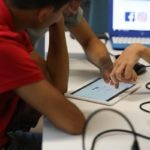A cybersafe summer at BBVA
This summer, approximately 400 children and teens between the ages of 9 and 17 enjoyed BBVA’s cybersafe Fridays. The bank held a series of different workshops to raise awareness and educate employee families about how to use technology and social networks safely.

In July and August, BBVA’s Security Culture department organized Cybersafe Fridays at BBVA City. The goal of this initiative was to reduce the risks that come with using new technologies by educating and raising awareness among professionals and society in general. Around 400 children and teenagers between the ages of nine and 17 participated in nine workshops, which consisted of different activities based on their level of knowledge.
“We want to support both our employees and their families so that they always use the Internet and social networks safely,” explains Ana Gómez, the Head of Security Culture at BBVA. “Security is a priority for BBVA and this initiative is part of the variety of activities that seek to ensure that all employees adopt safe behaviors in the way they manage their professional and personal information on an everyday basis,” she adds.
Following the success of past initiatives such as the family cybersecurity day in May, the bank’s Security Culture team decided to increase the scope by covering different topics over the summer holidays, specifically focusing on managing social networks and the risks that come with sharing personal information online. “It worked really well. The children had fun and really understood the purpose of the sessions. They learned that there are risks online and how to detect them, while acquiring tools to avoid them,” adds the head of the department.

Los talleres han puesto especial foco en el uso seguro de redes sociales.
During the workshops, the participants used different devices and learned about the risks they could face if they do not use social networks and the Internet responsibly. One of the exercises consisted of the youth falling victim to a supposed cyber attack in order to show them how easy it could be to experience an attack of this kind if they do not act responsibly online. “And at the same time, it also taught them how to avoid exposure to them,” explains Gómez.
Prevention is an essential part of protecting themselves from possible online threats. For this reason, the bulk of the workshops focused on this aspect, teaching them to create strong and robust passwords for example, as well as how to identify and prevent cyberbullying and what to do if they detect it.
They also discussed the risks of connecting to public WiFi networks, how to identify fake news online and how to recognize fake social network profiles. In addition, the workshops raised awareness of the risks of providing personal information or information that could be used in an illegal way against minors online. “Without a doubt, it taught them useful practices to prevent the risks they could encounter in their everyday use of the Internet and social networks,” adds Gómez.